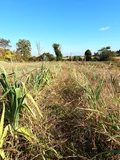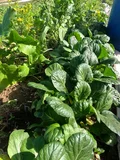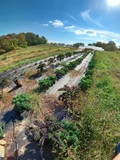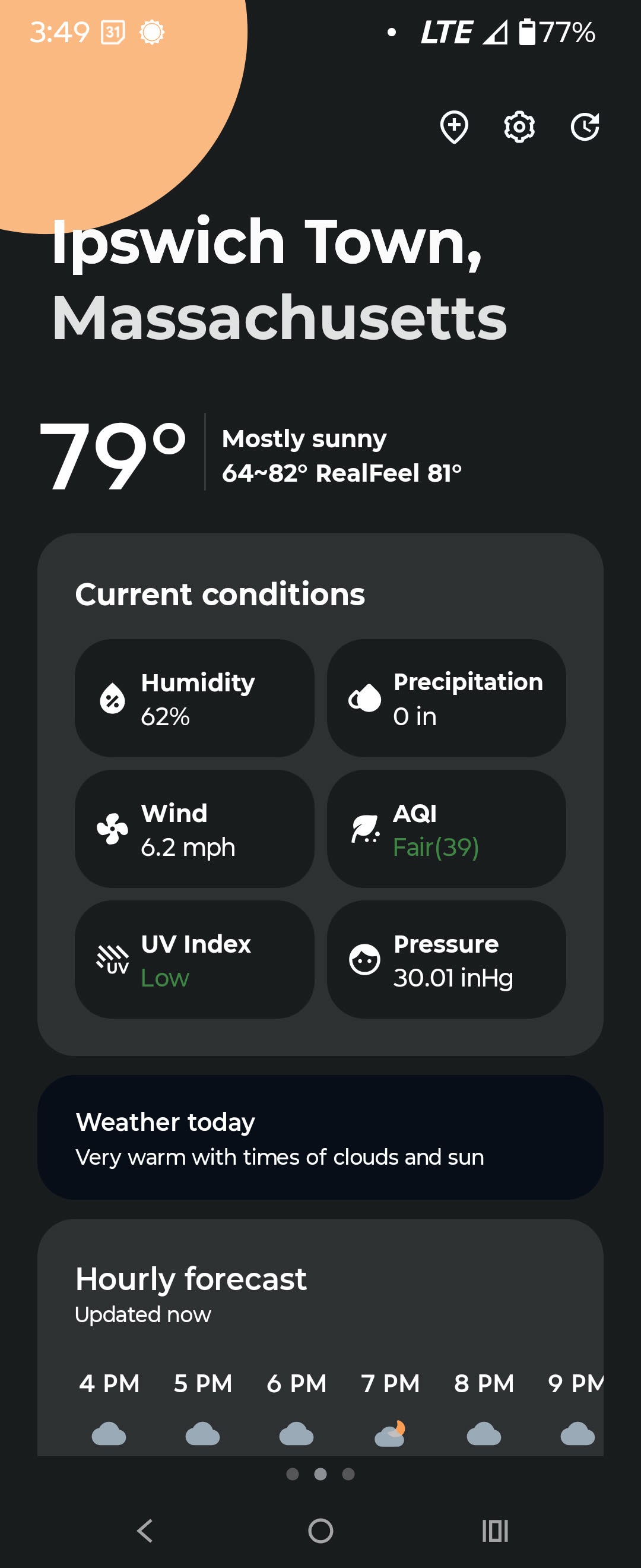TL;DR
We harvested kale, tatsoi and basil. I also harvested the first of the leeks this year, a favorite of mine and thus the hard work was a special treat for me. Abstracting is a past-time of mine, even the leaky/leeky ones.
First, the Tatsoi
For the last two weeks of the summer share and into the fall share, we had seeded a few rows of tatsoi here and there. Since it’s a cut-and-come-again crop, we’ve also been able to harvest a few times already. Some of it has some minor bug damage, but it’s still entirely tasty and nutritious.
People who want no imperfections in things baffle me. At a time where bombs are dropping on people almost daily, pampered U.S. consumers complain about food prices but throw away mild insect damaged organic produce. It’s kind of similar to execs who throw away otherwise great business plans and workforce simply because there’s a promise of something marginally better in another grassy field.
This all depends on your definition of what perfect means. Nature is perfectly fine with variation, disaster, slow regrowth, multiplicity, and lack of centralized authority. The harder you try to curate it into some idea of ‘perfect’, the harder it pushes back. So eat some salad greens and enjoy how beautiful they are because of (not despite) a few nom-noms from the insects whose homes we disturb to grow food.
‘Leeky’ Abstractions
I used to listen to this guy Joel on a podcast about 17 years ago talk about ‘leaky abstractions’. While building the absolute behemoth that became StackOverflow and running Fog Creek Software at the same time, he talked about how bad an idea it is to try to re-implement custom DNS, the trials and tribulations of running large-scale websites on ASP.NET and the challenges of building a company with a diverse team.
A leaky abstraction is a software design concept where a simplified interface (abstraction) exposes details or limitations of its underlying, more complex implementation, contrary to the goal of hiding complexity.
Building many microservices in my homelab, I think about this a lot because I don’t want to accidentally couple them together and thus make it harder to evolve independently from their future consumers. Much of what was discussed on that podcast was in fact a leaky abstraction itself, but I remember one episode where my understanding of having to evolve with your customers over time was originally formed.
Well, my now career has similar parallels. The more I farm, the more I want to farm. The hard work fades away and what’s left is entrepreneurship, complexity, healthy exercise, and of course very tasty and nutritious food. This blog is my abstraction from all of it, and sometimes a leaky one.
As I uprooted 250 leeks today, I thought about what kinds of details leak out into the world based on what the farm brings to market, when it does and doesn’t, and how it operates in front of customers. Most people who eat the organic food we lovingly and painstakingly grow don’t ever visit the farm and many have no background in farming, so little details that leak out are often lost to lack of context.
My hope is that with all the context I’ve earned this year, it will inform my own future business plans and help me make better decisions as I continue to grow and evolve as a farmer and entrepreneur.
AI Summary from Field Notes
Yeah, looking through the notes, the shallowness of knowledge around organic agricultural dynamics in these big LLMs (like Qwen3 and Ollama) is pretty ‘leaky’. After all, it’s just huge statistics about prior knowledge expressed as words out on the internet, but it lacks context.
It’s going to be a busy two weeks for me, but I’m going to try to steal small bits of time here and there to work on the RAG prototype of the summarization process and all the comparison testing it will take for me to feel confident in rolling it out.
Part 1
Main Themes:
- Daily farm tasks and observations (watering pigs, packing the electric van, monitoring chicken water usage).
- Participation in a farm business management course (prerequisite for a sustainable farm incubator program at Moraine Farm, affiliated with Tufts University).
- Integration of academic planning with farm work, including business planning and future research.
- Use of technology (LLM-driven note-taking, transcription, and summarization) to organize coursework and reflections.
Activities Performed by the Intern:
- Pack the electric van for CSA pickup.
- Water the pigs.
- Observe and note water usage differences in chickens (combined vs. separated).
- Document daily tasks and observations in a farming blog.
- Engage in coursework for the farm business management planning course.
New Things Not Yet Encountered:
- The farm business management course (prerequisite for the Moraine Farm incubator program).
- The concept of using LLM-driven tools for note-taking, transcription, and summarization in academic and agricultural contexts.
- The integration of formal business planning with on-farm operations.
Questions and Future Areas of Research:
- How will the course structure (prerequisite for the incubator program) align with the intern’s long-term goals?
- Will the intern proceed with the course or defer it to focus on farm work or tech contracts?
- How will the LLM tools (note-taking, transcription, summarization) aid in organizing coursework and future research?
- What are the dynamics of the farm incubator program and its connection to Tufts University’s sustainable agriculture initiatives?
- How can the farming blog be effectively used as a platform for both agricultural observations and academic coursework?
Suggested Actions:
- Complete the farm business management course to meet prerequisites for the Moraine Farm incubator program.
- Use the farming blog as a separate, organized space for coursework, reflections, and future research.
- Explore the incubator program’s structure and resources to determine its alignment with the intern’s career goals.
- Continue using LLM tools for note-taking and summarization to streamline academic and agricultural documentation.
- Reflect on the balance between farm work, academic pursuits, and future career planning (e.g., deferring the course or pursuing tech contracts).
Part 2
Main Themes
- Farm Daily Operations: Cleaning bins, preparing wash stations, and assisting with animal chores.
- Harvesting Process: Harvesting and washing leeks and tatsoi, with challenges in timing and crop distribution.
- Crop Life Cycle: Observing the growth and harvesting of leeks (planted in April, harvested in October) and other crops.
- Weather Impact: Noting how high temperatures (80°F) affect produce freshness and harvesting efficiency.
- Team Coordination: Collaborating with Jamie and others, including managing limited crew resources.
Activities Performed by the Intern
- Cleaned bins and prepared the veg wash station.
- Assisted with pig and chicken chores.
- Towed a broken-down gator using a tractor.
- Harvested leeks (planted in April) and tatsoi.
- Washed and binned harvested produce.
- Coordinated with Jamie to manage crop rows and harvesting schedules.
- Documented observations about crop growth and weather effects.
New Things Encountered
- Leeks: Harvesting a long-cycle crop (planted in April, harvested in October).
- Gator Maintenance: Towing and repairing a broken-down gator.
- Weather Impact: Noting how high temperatures (80°F) cause wilting in harvested produce.
- Crop Distribution Challenges: Irregular row layouts and mixed harvesting due to crop maturity.
Questions and Future Research Areas
- Optimal Harvesting Timing: How does the 80°F weather affect the quality of harvested produce?
- Crop Life Cycle Efficiency: Can the leek growth cycle be optimized for faster harvests?
- Harvesting Techniques: What methods can improve efficiency for irregularly distributed rows?
- Weather Resilience: How can the farm mitigate wilting risks during high-temperature days?
- Gator Maintenance: What steps can prevent future breakdowns of equipment?
Suggested Actions
- Monitor Weather Conditions: Track temperature and humidity to adjust harvesting schedules.
- Optimize Crop Layouts: Plan for irregular rows by adjusting harvesting routes or tools.
- Conduct Crop Cycle Studies: Document leek growth stages to refine planting/harvesting timelines.
- Repair Gator: Schedule maintenance to prevent future breakdowns.
- Train Team on Weather Impact: Educate staff on how weather affects produce quality and harvesting.
Part 3
Main Themes:
- Farm Work Variety: The intern’s day involves multiple tasks, including animal care, harvesting, cleaning, and precision-based labor.
- Weather Consideration: Some tasks (e.g., fixing “leaks”) are better suited for rainy days.
- Time Management: The intern balances immediate tasks (harvesting, bagging) with deferred work (leaks).
- Precision in Labor: Tasks like potato weighing require strict attention to detail.
Activities Performed by the Intern:
- Helped with chicken chores.
- Tended to “leaks” (likely maintenance or irrigation tasks).
- Harvested kale.
- Washed kale.
- Picked basil for a CSA pickup in Essex.
- Bagged 61-pound potato bags.
- Weighed potatoes to ensure precision (±0.05 pounds).
New Things Not Yet Encountered:
- “Leaks”: A specific task or issue the intern is unfamiliar with, possibly related to farm infrastructure.
- CSA Pickup Location in Essex: A new location or process for distributing produce.
- Precision Weighing Standards: The exact method for ensuring potato bags meet weight requirements.
Questions/Future Research Areas:
- What exactly are “leaks,” and how are they addressed on the farm?
- How does the CSA pickup process in Essex work, and what role does the intern play in it?
- What are the implications of leaving tasks (e.g., leaks) for rainy days?
- How is the 0.05-pound potato weighing standard enforced, and what tools are used?
Suggestions/Actions:
- Prioritize Immediate Tasks: Harvest and prepare produce for pickups before deferring tasks like fixing leaks.
- Weather-Adapted Scheduling: Plan tasks like fixing leaks for rainy days to avoid disruptions.
- Standardize Weighing Process: Develop a clear protocol for potato bagging to ensure consistency and efficiency.
- Document CSA Logistics: Clarify roles and procedures for the Essex CSA pickup to avoid confusion.
[end of post]
Enjoy Reading This Article?
Here are some more articles you might like to read next:








